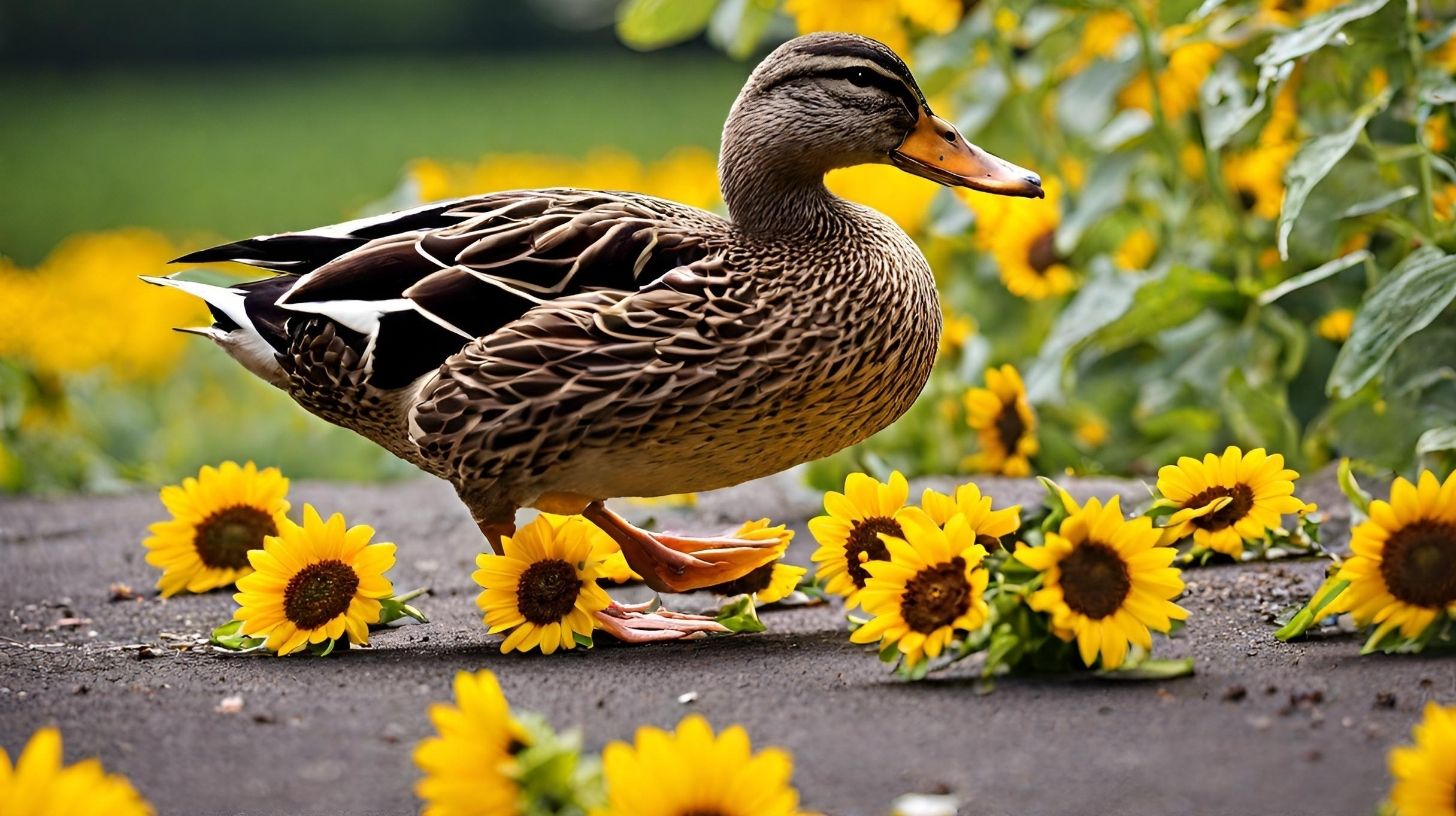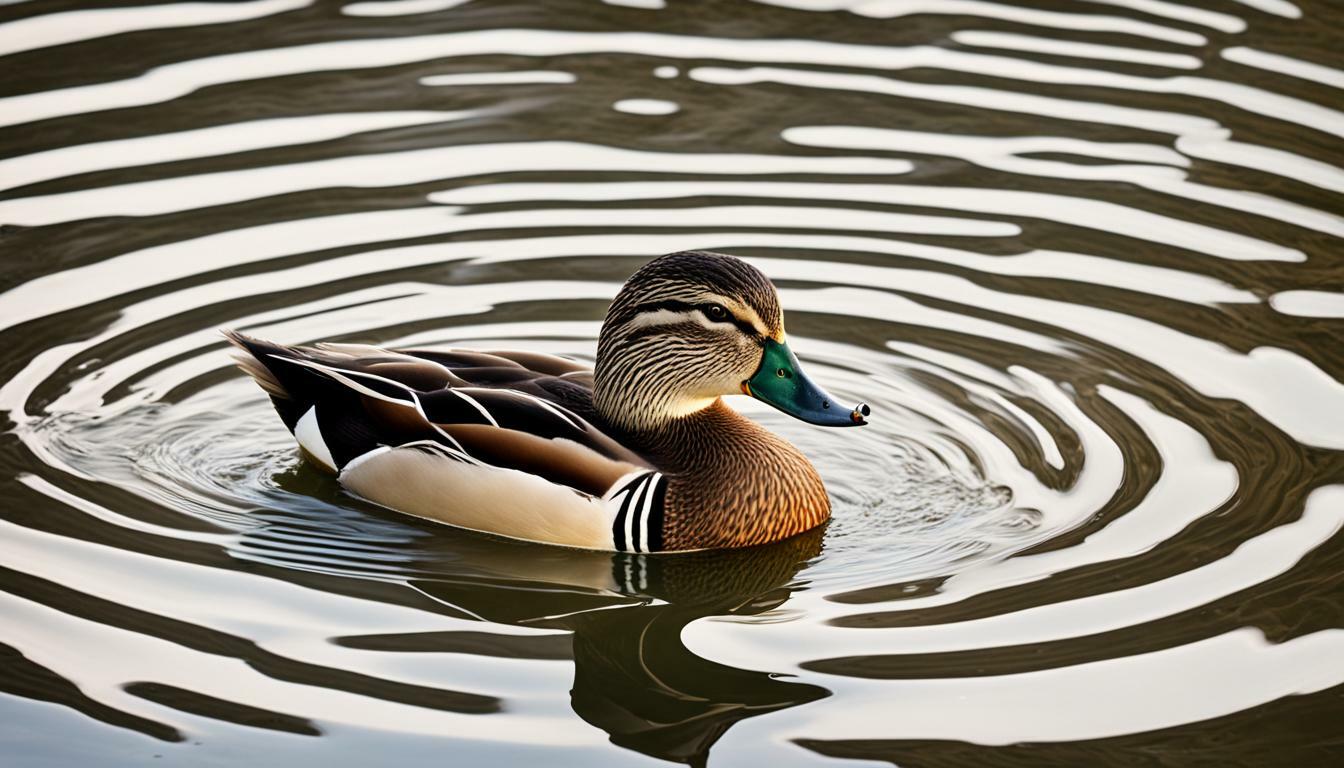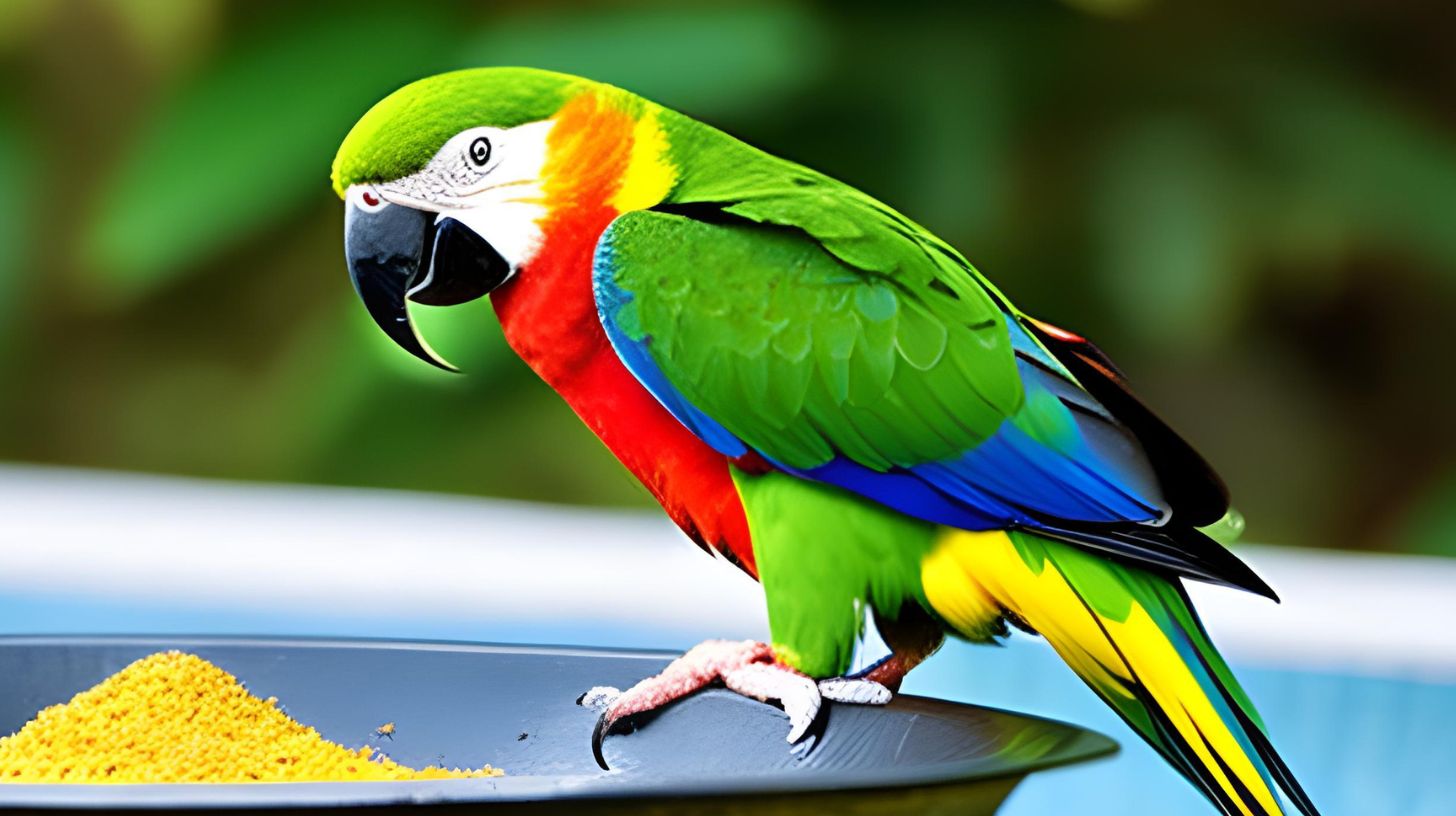Can Ducks Eat Oranges?
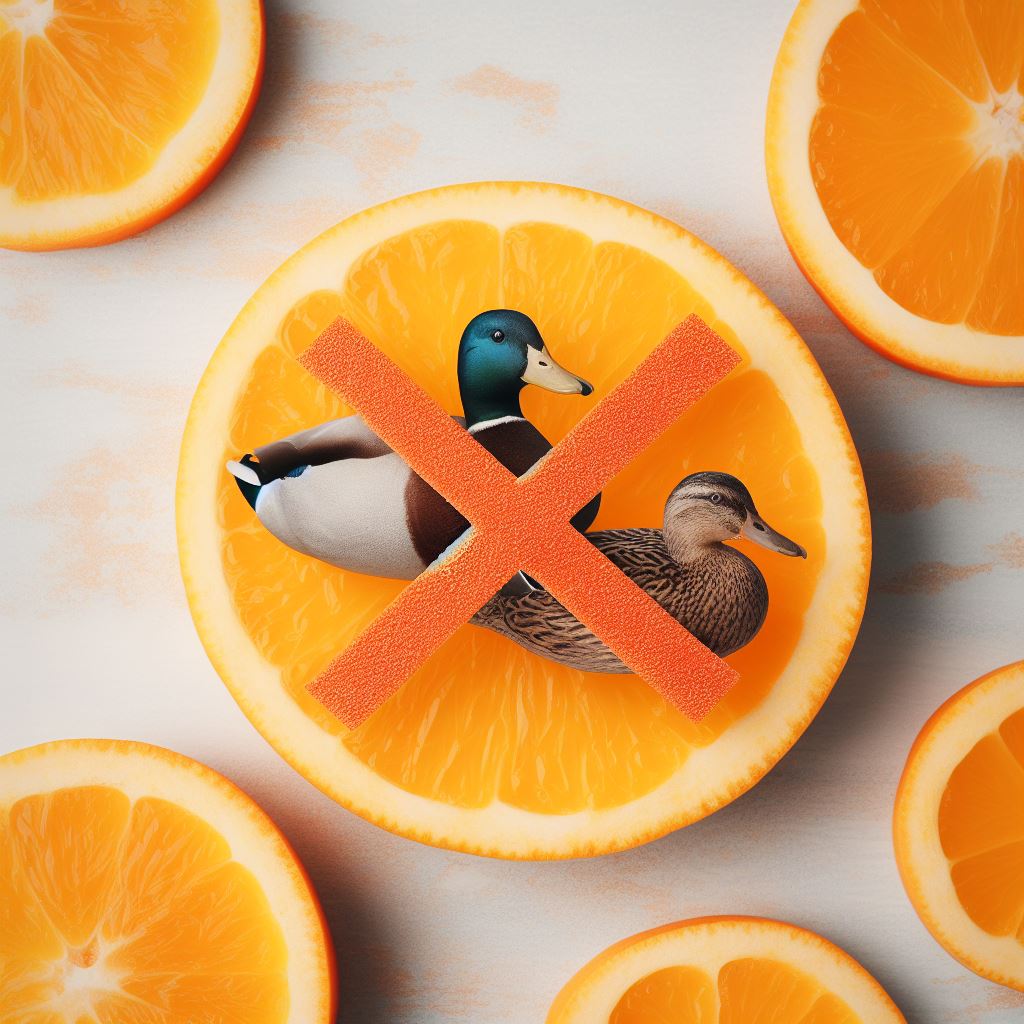
Table of content:
Oranges make a refreshing treat for humans, but should our feathered friends indulge in the juicy citrus fruit as well? Many duck owners wonder if sharing orange slices with their flock is safe or if the acidic fruit can cause problems for ducks’ digestive systems.
This complete guide dives into the risks and benefits of feeding oranges to ducks to help owners make informed decisions about occasional citrus treats.
Ducks’ Diets
Before examining how oranges in particular may affect ducks, it’s important to understand the dietary needs these aquatic birds have evolved to thrive on.
Natural Duck Diets
In the wild, a duck’s diet consists mainly of plant foods found near the water. Ducks forage for seeds, grain, aquatic plants and algae, tender shoots, and small invertebrates. Their varied diet provides:
- Protein for growth and egg production from insects, larvae, snails, and plant foods.
- Carbohydrates for energy from grains and plant material.
- Fats and fatty acids for warmth and nutrient absorption from certain plants, fish, and insects.
- Vitamins and minerals for bone health, enzyme function, and metabolism from diverse natural foods.
Domestic Duck Diets
As duck companions, these birds still have the same nutritional requirements as their wild counterparts. While commercial duck feed provides a balanced diet, domestic ducks also enjoy variety in the form of:
- Greens like kale, spinach, swiss chard, or lettuce
- Chopped veggies such as sweet potato, squash, peas, corn, broccoli, carrots
- Fruits like melon slices, chopped berries, bananas, grated apples
- Cooked rice, barley, quinoa or pasta
- Mealworms, river shrimp, crickets for extra protein
Proper nutrition is extremely important for ducks to thrive. But how do citrus fruits like oranges fit into their dietary needs?
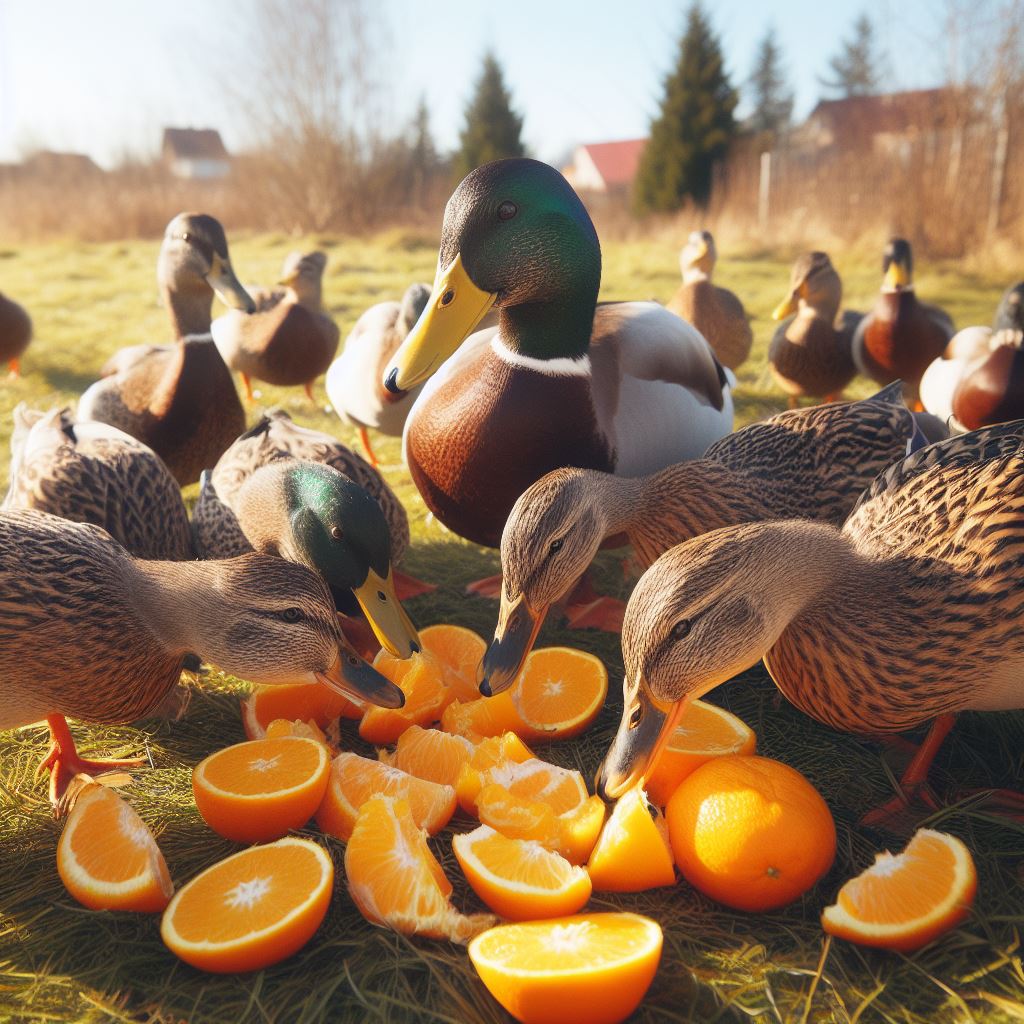 The Risks of Feeding Oranges to Ducks
The Risks of Feeding Oranges to Ducks
While humans enjoy oranges for vitamin C and antioxidants, the acidic fruit poses several risks to ducks’ health and wellbeing:
Calcium Malabsorption
Oranges and other citrus fruits contain compounds called oxalates. These antinutrients bind to calcium in the digestive tract, preventing ducks from absorbing this essential mineral into their bloodstream.
Over time, poor calcium absorption can contribute to:
- Brittle, easily broken bones
- Weak, soft-shelled eggs
- Bone deformities like slipped tendons
Calcium is crucial for strong bones and healthy egg production. Avoiding oxalate-rich foods like oranges helps ducks properly utilize calcium from their diet.
Digestive Upset
The acidic juices and rinds of oranges are difficult for ducks to digest. Their digestive systems aren’t designed to break down tough citrus peels.
Consuming oranges can lead to:
- Stomach cramps and discomfort
- Loose droppings or diarrhea
- Potential intestinal blockages from rinds
These digestive disturbances not only make ducks uncomfortable but also prevent them from absorbing nutrition from their food.
Minimal Nutritional Value
Unlike naturally occurring duck foods, oranges offer little nutritional benefit:
- High sugar content from fructose but few vitamins & minerals
- No protein for growth and egg production
- No healthy fats for warmth and brain function
- High water content without fiber for gut health
There are many healthier treats that provide real nutrition without the risks of oranges.
Choking Hazard
Whole orange slices or large chunks pose a significant choking risk for ducks that gobble their food. Always peel oranges and cut them into manageable bite-sized pieces before feeding to ducks.
Healthier Fruit Alternatives for Ducks
While oranges should be avoided, ducks can safely enjoy a number of other fruits in moderation:
Berries
Raspberries, blackberries, and blueberries provide antioxidants without excess sugar. Their soft texture and small size make them easy to digest.
Melons
Watermelon, cantaloupe, and honeydew contain more nutrients than oranges without the acidity. Ducks relish their sweet flavor.
Stone Fruits
Peaches, nectarines, plums, and cherries offer a treat of natural sugars. Pit the fruit first to avoid swallowing hazards.
Tropical Fruits
Kiwis, mangos, papaya, pineapple, and bananas provide fiber, vitamins, minerals, and beneficial enzymes.
Seeded Fruits
Chopped pears, apples, grapes, and tomatoes add diverse nutrients and refreshing moisture.
When incorporating fruit into ducks’ diet, moderation is key:
- Offer no more than 15% of total daily food intake
- Chop/mash fruits into bite-size pieces for safety
- Introduce new fruits slowly to observe any digestive issues
- Always provide plenty of fresh water for ducks as well
With a predominantly vegetable and protein-based diet, small fruit portions a few times a week provide enjoyable diversity without risking ducks’ health.
Can Ducks Eat Orange Rinds or Seeds?
Beyond the acidic orange flesh, the rinds and seeds of oranges also pose hazards for ducks:
Inedible Rinds
Orange peels contain tiny oil glands that ducks cannot properly digest. Consuming more than a tiny nibble of rind risks:
- Intestinal irritation and upset stomach
- Potential blockages
The fibrous peel also provides minimal nutrition. For both safety and optimal nutrition, ducks shouldn’t ingest orange peels.
Choking Hazards
Whole orange seeds can lodge in ducks’ windpipes causing choking. If providing seedless orange slices, ensure the flesh is chopped into tiny pieces so ducks don’t choke.
To avoid aspiration pneumonia, never let ducks eat whole oranges. The combination of flesh, membranes, and seeds poses a high choking risk. Remove all seeds, peel oranges, then chop the flesh into duck-sized portions before feeding.
Benefits Ducks Receive From Oranges
Given all the risks, is there any scenario in which oranges benefit ducks’ health? Let’s examine a few potential pros:
Nutrient Variety
The small amounts of vitamins, minerals, and antioxidants oranges provide could add diversity to ducks’ nutrition profile. However, the calcium absorption blocking outweighs this benefit.
Natural Foraging
Many ducks relish the opportunity to nibble and forage orange slices. This natural behavior provides enrichment. Yet other fruits and foods offer the same foraging enrichment with better nutrition and less risk.
Fertilizer
If given whole oranges, ducks may ingest seeds that sprout after passing through their digestive tracts. While some view this as a bonus way to spread fruit trees, ducks don’t actually utilize or benefit from the sprouted seeds.
Overall, the risks of oranges far outweigh their limited benefits for ducks’ health and wellbeing. There are many safer, healthier treatment alternatives duck owners can offer instead.
Conclusion: Can Ducks Eat Oranges?
Ducks’ bodies are not adapted to make use of citrus fruits. While they may exhibit excitement over juicy orange slices, these acidic fruits cannot contribute to balanced nutrition for aquatic birds.
For duck owners, the answer is clear. Oranges should be avoided as occasional treats due to the hazards they present. Fortunately, ducks can safely enjoy a diverse range of healthier fruits and vegetable offerings as part of their supplemental diet. By understanding proper duck nutrition, owners can make the best treat choices for their pets.
Focusing on natural protein sources, fibrous greens, and chopped fruits low in acidity is the wisest way to supplement commercial duck diets. With some thoughtful moderation and variety, ducks can continue to thrive on the foods their bodies evolved to digest and absorb nutrients from.
Welcome. I’m Adreena Shanum, the proud owner of this website, and I am incredibly passionate about animals, especially poultry. I founded adreenapets.com as a labor of love, stemming from my desire to share my knowledge and experiences with poultry enthusiasts worldwide.


